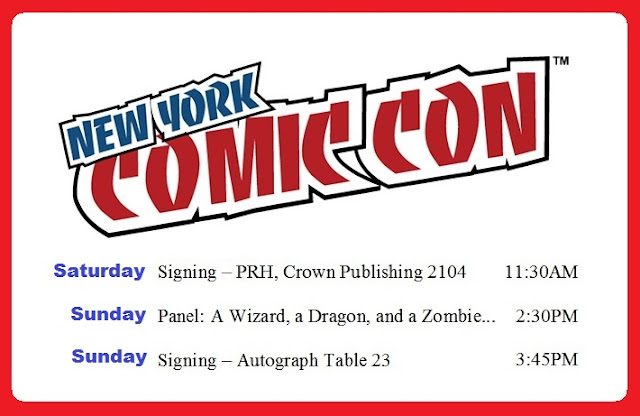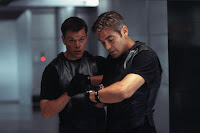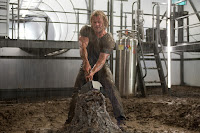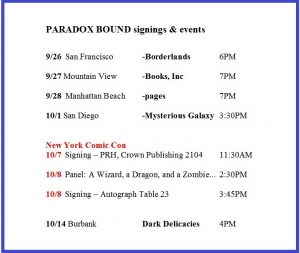Well, this is overdue.
So sorry for the long delay. I’d hoped to get this up before I left for NYCC, but that day turned into the usual rush of dealing with this and that and more of this. I don’t know why it’s always so frantic. It’s not like I was going to be there for a week or something. Two nights, but I always pack as if I’m gone for a week anyway. I’ve got stuff for different weather conditions.
Stuff for downtime. Some stuff for fans. I’m ridiculously overprepared.
But let’s take a brief break from that and talk about paragraph breaks.
Like that weird one I just did up there.
I’ve mentioned paragraphs here once or twice before. If sentences are taking a nice bite of the story, paragraphs are three or mouthfuls before having a taste of something else. I eat some spaghetti, then I have a sip of wine or maybe nibble some garlic bread. The different tastes and textures work together to make the meal more enjoyable. If I just had to sit and eat a bowl of spaghetti with nothing to break it up, it’d get kind of monotonous. No matter how much I like spaghetti.
Hell, at some point, depending on the size of the bowl, I’d probably even start dreading the stuff.
And that’s what I’m trying to avoid with paragraphs. I don’t want readers to get bored or intimidated by what they see on the page. I want to break up the text in a way that furthers the story.
For example, when two people are talking, my attention goes back and forth between them. Yakko to Wakko. Someone new talks, and my attention shifts to them. Perhaps it’s going back and forth, or it could be bouncing between three or four people.
Think of paragraphs as those moments of attention. If something shifts my attention away, I should have a new paragraph. And then maybe it’ll shift back. or perhaps shift to something new, and my attention will follow it there.
Even if the same character keeps talking, it can get broken into two or more paragraphs. In any long monologue, I should be able to sense the pauses and shifts, the places where our attention moves on to a slightly different aspect of the topic. Maybe I’m going on about death, with a slight shift into funeral arrangements, my time in Kazakhstan, maybe even thinking ahead to my own end. Perhaps we’re talking about relationships, and being in love vs. young love vs. older love, and maybe those few times we mistook sex for love, or knew it wasn’t love and didn’t really care at the moment. In each of these long discussions, it’s easy to see where it could—and should—spin off into a separate paragraph.
Y’see, Timmy, when I don’t break things up, I end up with a paragraph where it jumps around a lot, nothing’s really described, and it covers a lot of ground. Sometimes I may do that for a certain effect, yeah, but most of the time… that’s not great storytelling. Of course, the flipside to this is breaking something in the wrong place.
When I do that, the flow stumbles, because it means I’ve probably broken a point of focus. Like up at the top, when I broke the second paragraph in the middle of describing the items I was packing. Or just two sentences back. I should’ve started the new paragraph on “Of course,” because where I did break it cut off this whole idea I’m trying to explain.
When I do that, the flow stumbles, because it means I’ve probably broken a point of focus. Like up at the top, when I broke the second paragraph in the middle of describing the items I was packing. Or just two sentences back. I should’ve started the new paragraph on “Of course,” because where I did break it cut off this whole idea I’m trying to explain.
Which, granted, helped to explain it.
See—new idea, new break, great flow.
 Breaks also alter the pacing. Have you ever noticed in a lot of movies and television shows, we get more cuts (jumping from one camera angle to another) as action and tension build? We jump from Arya to Brienne, back to Arya, to a wide shot, to Sansa watching them duel, then back to Brienne and Arya for that dagger flip…
Breaks also alter the pacing. Have you ever noticed in a lot of movies and television shows, we get more cuts (jumping from one camera angle to another) as action and tension build? We jump from Arya to Brienne, back to Arya, to a wide shot, to Sansa watching them duel, then back to Brienne and Arya for that dagger flip…
You can feel the energy and the pace right there, just seeing it written out, can’t you? We understand there’s a lot going on and that all these people are—in their own way—involved in making this complete scene. Our attention jumps around in one paragraph, but it does it fast because this is a fast-paced scene.
See, in prose (unlike film), those breaks would slow down the action. Notice how the whole Arya–Brienne fight, almost two minutes on film, gets summed up really nicely in there? When an action scene moves into several paragraphs, it tends to make things drag. If I take six or seven lines to describe something that happens in one or two seconds, I’m altering the flow and forcing the action to that pace.
There may be reasons to do that, sure… but I’d better have a reason if I’m doing it that way.
There’s also another issue at work here. As readers, we kind of expectthese breaks. How often have you seen a wall of text in a book or online and just groaned a bit (out loud or internally). They make that TL;DR reflex twitch in the back of our brains. It’s because we understand information doesn’t come in giant slabs like that. A wall of text is someone going on way more than necessary about a single topic.
There may be reasons to do that, sure… but I’d better have a reason if I’m doing it that way.
There’s also another issue at work here. As readers, we kind of expectthese breaks. How often have you seen a wall of text in a book or online and just groaned a bit (out loud or internally). They make that TL;DR reflex twitch in the back of our brains. It’s because we understand information doesn’t come in giant slabs like that. A wall of text is someone going on way more than necessary about a single topic.
 The breaks help us keep things organized, too. Remember I mentioned the back and forth aspect of watching a conversation? We tend to follow that in prose, too. If I have dialogue between Yakko and Dot, we don’t expect that dialogue to share a paragraph. The breaks help us set the back and forth rhythm in our minds. And when something disrupts that rhythm, it also breaks the flow.
The breaks help us keep things organized, too. Remember I mentioned the back and forth aspect of watching a conversation? We tend to follow that in prose, too. If I have dialogue between Yakko and Dot, we don’t expect that dialogue to share a paragraph. The breaks help us set the back and forth rhythm in our minds. And when something disrupts that rhythm, it also breaks the flow. And, as I’ve mentioned many times before, breaking the flow of my story can be fatal.
Because that’s my ultimate goal. To have my story be smooth and readable. For it to draw people in, not push them away. You’ll find people who try to tell you the punctuation and formatting of a story don’t matter, that a good story will stand on its own despite those things. The truth is, though, the way it’s set out is going to have a huge impact on how it’s interpreted by readers. How easily it flows. How fast it feels. How accessible it looks.
So break things up. Y’know before your readers decide they need a break…
Next time, I’d like to talk a little more about the center of our attention.
Until then, go write.






